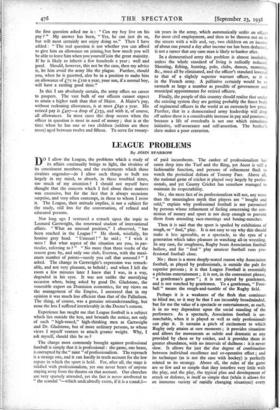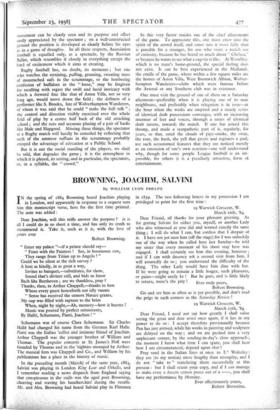LEAGUE PROBLEMS
By JOHN SPARROW
DO I allow the League, the problems which a study of its affairs continually brings to light, the rivalries of its constituent members, and the excitements which those rivalries engender—do I allow such things to bulk too largely in my mind, to absorb, in these troubled times, too much of my attention ? I should not myself have thought that the concern which I feel about these matters was excessive, but for the fact that it always occasions surprise, and very often contempt, in those to whom I avow it. The League, their attitude implies, is not a subject for the study, still less for the conversation, of refined and educated persons.
Not long ago I ventured a remark upon the topic to Leonard Cartwright, the renowned student of international affairs. " What an unusual position," I observed, " has been reached in the League 1 " He shook, wistfully, his leonine grey head. " Unusual ! " he said ; " I wish it were ! But what aspect of the situation are you, in par- ticular, referring to ? " " No more than three weeks of the season gone by, and only one club, Everton, with the maxi- mum number of points—surely you call that unusual ? " I asked. The change in Cartwright's expression was remark- able, and not very pleasant, to behold ; and when I left the room a few minutes later I knew that I was, in a way, degraded in his eyes. It was not unlike the mortifying occasion when, being asked by good Dr. Gladstone, the venerable expert on Dominion economics, for my views on the management of the Empire, I answered that in my opinion it was much less efficient than that of the Palladium. The thing, of course, was a genuine misunderstanding, but none the less I suffered irretrievably in the Doctor's esteem.
Experience has taught me that League football is a subject which lies outside the ken, and beneath the notice, not only of such " high-toned," high-thinking men as Cartwright and Dr. Gladstone, but of more ordinary persons, to whose views I myself venture to attach greater weight. Why, I ask myself, should this be so ?
The charge most commonly brought against professional football is simply that it is professional : the game, one hears, is corrupted by the " taint " of professionalism. The reproach is a strange one, and it can hardly in truth account for the low repute in which the sport is held. For, after all, the stage is riddled with professionalism, yet one never hears of anyone staying away from the theatre on that account. Our churches are very sparsely attended, yet the fact is never attributed to " the scandal "—which undcubtedly exists, if it is a scanda- of paid incumbents. The canker of professionalism has eaten deep into the Turf and the Ring, yet Ascot is still a fashionable function, and persons of refinement flock to watch the periodical defeats of Tommy Farr. Above all, the national game of cricket is played very largely by profes- sionals, and yet County Cricket has somehow managed to maintain its respectability.
No ; the mere fact of its professionalism will not, any more than the meaningless myth that players are " bought and sold," explain why professional football is not patronised by persons whose refinement of feeling concerning the con- nexion of money and sport is not deep enough to prevent them from attending race-meetings and boxing-matches.
Then it is said that the sport is spoiled by exhibitions of rough, or " foul," play. It is not easy to say why this should make it less agreeable, as a spectacle, to the eyes of a generation which takes pleasure in watching all-in wrestling. In any case, for roughness, Rugby beats Association football hollow, and for " foul " play amateur football runs pro- fessional football close.
No ; there is a more deeply-seated reason why Association football, as played by professionals, is outside the pale for superior persons ; it is that League Football is essentially a plebeian entertainment ; it is not, in the convenient phrase, " a gentleman's game " ; it is not played by gentlemen, and is not watched by gentlemen. To a gentleman, " Foot- ball " means the rough-and-tumble of the Rugby field.
Perhaps it is a weakness of the flesh that continues to blind me, or it may be that I am incurably broadminded, but for me the value of a spectacle or entertainment, as such, is in no way dependent upon the social standing of the performers. As a spectacle, Association football is un- matchable, when it is played as well as only professionals can play it. It sustains a pitch of excitement to which Riigby only attains at rare moments ; it provides situations and allows for movements as subtle and dramatic as any provided by chess or by cricket, and it provides them in greater abundance, with no intervals of dullness : it is never slow. It allows for just the due degree of combination between individual excellence and co-operative effort ; and its technique (as is not the case with hockey) is perfectly related to its strategy. Above all, the rules of the game are so few and so simple that they interfere very little with the play, and the play, the typical plan and development of attack or defence, is itself so simple that (while it allows for an immense variety of rapidly changing situations) every movement can be clearly seen and its purpose and effect easily appreciated by the spectator ; on a well-constructed ground the position is developed as clearly before his eyes as in a game of draughts. In all these respects, Association football is equalled only, as a spectacle, by the Russian Ballet, which resembles it closely in everything except the kin i of excitement which it aims at creating.
Rugby football has, no doubt, its moments ; but one who watches the straining, puffing, grunting, sweating mass of moustached oafs in the scrummage, or the lumbering confusion of buffaloes in the " loose," may be forgiven for recalling with regret the swift and lucid intricacy with which a forward line like that of Aston Villa, not so very long ago, would move down the field ; the deftness of a performer like S. Brooks, late of Wolverhampton Wanderers, of whom it was said that he could " make the ball talk " ; the control and direction visibly exercised over the whole field of play by a centre half back of the old attacking school ; and the sure and accurate placing of a pair of backs like Male and Hapgood. Missing these things, the spectator at a Rugby match will hardly be consoled by reflecting that each of the amateur ruffians in the scrummage probably enjoyed the advantage of education at a Public School.
But it is not the social standing of the players, we shall be told, that degrades the game ; it is the atmosphere in which it is played, its setting, and in particular, the spectators, or, in a syllable, the " crowd." In this very factor resides one of the chief allurements of the game. To appreciate this, one must enter into the spirit of the crowd itself, and enter into it more fully than is possible for a stranger, for one who visits a match out of curiosity, because he has heard so much about " Chelsea,' or because he wants to see what a cup-tie is like. At Wembley, which is no team's home-ground, the special feeling does not exist. It can be best experienced in the Midlands, the cradle of the game, where within a few square miles arc the homes of Aston Villa, West Bromwich Albion, Wolver- hampton Wanderers—clubs which were famous before the Arsenal or any Southern club was in existence.
One must visit the ground of one of them on a Saturday afternoon—preferably when it is playing one of its near neighbours, and preferably when relegation is in issue—at the hour when the works are emptied and a steady series of identical drab processions converges, with an increasing murmur of feet and voices, through a series of identical drab streets, towards the match. If one has joined this throng, and made a sympathetic part of it, regularly, for years, so that, amid the clouds of pipe-smoke, the sway, the roar, the hush, the yell that greets and registers a goal, are such accustomed features that they are noticed merely as an extension of one's own reaction—one will understand why, though for some people League football is an im- possible, for others it is a peculiarly attractive, form of entertainment.







































 Previous page
Previous page